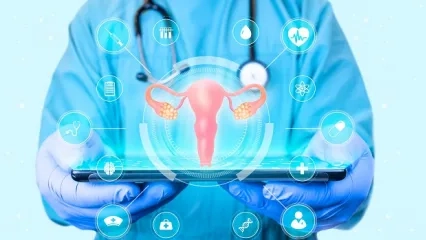Alo Yeditepe
Alo Yeditepe
10 Overlooked Signs of Menopause
The first findings that come to mind when menopause is mentioned are undoubtedly menstrual disorders and hot flashes. Apart from these, some signs of menopause can be ignored, especially by women who are not close to the expected menopause age.
While the average age of menopause is 51, the condition of entering menopause before the age of 45 is called premature menopause, and the condition of entering menopause before the age of 40 is called ovarian failure. Stating that they now encounter patients who present with menopause even in their twenties, Yeditepe University Hospitals Gynecology and Obstetrics Specialist Assistant Professor U. Mert Yeşiladalı said that the symptoms, which are not very known among the people, may also be a sign of menopause. Some of these symptoms are:
Breast Pain and Tension
Fluctuations in estrogen levels in the blood can cause tenderness, pain, and tension in the breast tissue. This is especially true in the early stages of the menopausal transition.
Insomnia
Recent studies show that 30-40 percent of women in the transition period of menopause have difficulty falling asleep. Even if the menstrual cycle has not yet been disrupted during the transition to menopause, the decrease in hormone levels can directly appear as a sleep problem.
Menstrual Headache
The condition called menstrual migraine is a headache experienced in every menstrual period. While this situation is experienced during the whole reproductive age in some women, it starts in the transition period of menopause in some other women. This is a problem caused by fluctuations in hormones and if cannot be solved by painkillers, hormone therapy is applied.
Depression and Anxiety
During the transition to menopause, the probability of women experiencing depression increases 2.5 times. This risk is higher in women who have experienced depression at some point in their lives. Anxiety is one of the psychological disorders that can occur during the transition to menopause.
Vaginal Dryness and Pain
With the decrease in the estrogen hormone, the secretions secreted during sexual intercourse also decrease, and the walls of the vagina become thinner. This condition occurs as dryness and pain during sexual intercourse. It can be treated with locally applied estrogen.
Forgetfulness
Brain functions are directly related to hormones and therefore, cognitive function impairments such as forgetfulness, inability to focus, and distraction, can be seen in the premenopausal period, where fluctuations in hormone levels are observed. In fact, premenopausal women have better memories than men, but some studies are showing that this situation is reversed during the transition to menopause.
Dry Skin
The culprit here is again the falling estrogen. Collagen, which provides elasticity to the skin, also falls with estrogen, so dryness, sagging, and wrinkles occur in the skin during this period. Patients who have not started hormone replacement therapy are recommended to use a good moisturizing cream.
Thinning Hair
This, like most other symptoms, is related to a decrease in estrogen levels. A good shampoo with a moisturizer helps with this problem.
Dry Mouth
This is one of the symptoms that can be easily ignored and can cause dental problems. Decreased saliva secretion can lead to bacterial growth in the mouth and undesirable conditions such as dental caries and bleeding gums.
Body Odor and Sweating
When estrogen levels drop, the area of the brain that controls body temperature senses overheating in the body and causes excessive sweating, such as during hot flashes, which can lead to an unpleasant body odor. It is the mechanism that causes night sweats.
Have a Check-up Without Wasting Time
One or more of the above findings may occur without a change in the menstrual cycle and may be a sign of menopause. The important point here is that women who want to have children and experience these symptoms at an early age should immediately consult a gynecologist and have their ovarian reserves evaluated. We strongly recommend that women with a family history of early menopause have their ovarian reserves checked, even if they do not have any symptoms. Our goal is to catch early menopausal patients before they enter menopause to collect their eggs if they have the desire to have children and to preserve their reproductive potential by egg freezing method. We can eliminate all other negative results with the hormone replacement therapy we give until the expected menopause age.
The symptoms mentioned above can frighten and cause discomfort in even the patients who have entered menopause at the expected ages. It is possible to avoid the negative effects of estrogen deficiency by giving hormone replacement therapy at these ages, and we discuss the pros and cons of this treatment with our patients and make a decision together. Whether they are on hormone replacement therapy or not, we follow up with our menopausal patients with certain tests, such as bone density measurement, at regular intervals, thus ensuring that they lead a healthy and quality life. Unfortunately, the risk of some conditions such as osteoporosis, cardiovascular diseases, calcification in the joints, and dementia may increase in unfollowed menopausal patients. However, with today's medical and technology, menopause is not a situation to be afraid of, we tell our patients that “Do not be afraid of menopause, but to be late and unfollowed.”
Press Coverage: sozcu
About
Faculty and Year of Graduation:
Hacettepe University Faculty of Medicine, 2009
”
See Also
- Contraceptive Methods: Birth Control and Effective Protection Options
- Uterine Polyps, Symptoms and Treatment
- What is Pelvic Floor? What are Their Duties?
- What is Hysteroscopy? Hysteroscopy Usage Areas
- What is Myoma? Myoma Symptoms and Treatment
- What is Laparoscopic Surgery in Gynecology?
- Causes of Female Infertility
- The Use of Non-Inpatient Closed Surgery is Increasing in Gynecological Diseases
- Chronic Pelvic Pain
- What is Polycystic Ovary Syndrome/PCOS?
- Postpartum Period
- Imaging Methods During Pregnancy
- Causes of Male Factor Infertility
- The Effect of Advanced Age on IVF Treatment
- Infertility
- Polycystic Ovary Syndrome
- Early Menopause
- Blocked Fallopian Tube
- Vaginismus
- Low Ovarian Reserve (AMH)
- Which Methods Increase Success in Treatment of Infertility?
- Intrauterine insemination (IUI)
- Microinjection
- Egg Cryopreservation
- Assisted Hatching
- Micro-chip
- Pre-implantation Genetic Diagnosis
- Endometriosis
- Co-Culture
- Ovarian Rejuvenation / PRP
- Getting Cancer Treatment Does Not Stop You from Having Children!
- Considerations for Embryo Transfer
- What Causes Menstrual Irregularity, How Is It Treated?
- Untreated Genital Problems Can Cause Urinary Incontinence
Alo Yeditepe






